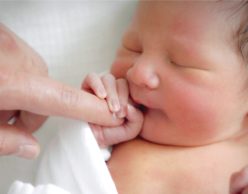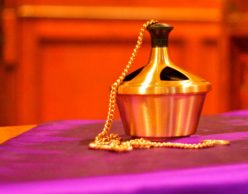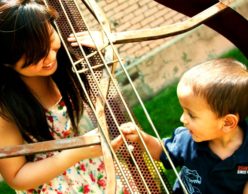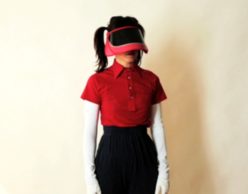A Leap of Faith

Nothing brings us to our knees more than the idea of ending life, except maybe starting life. For those who struggle with infertility, any hint of hope can be a beacon. Hope, though, doesn’t always come by way of faith — at least not the faith we were born into. It can come through science, through cultures very different from our own, through warm socks. Our Jewish-American Mash-Up Jennifer Gerson Uffalussy shares with us how infertility helped her redefine god, and the very idea of a miracle.
Today I’ll sit in services for Yom Kippur, the holiest day of the year in Judaism. I’ll be with my family, at a synagogue my parents helped found, with a community that has known me since I was a shy toddler with a bob and bangs. Alongside hundreds of others on the Day of Atonement, I will proclaim how God is about to seal off the pronouncements written on Rosh Hashanah last week in regards to who shall live and who shall die.
I have always loved this deeply ritualistic part of the service. It is inherently dramatic, cloaked in years of history, celebrations, and suffering. As a child, God’s Book of Life seemed so concrete, so tactile, like I could accidentally smear the ink if I were only to reach my hands up towards it. But this year, things are much more abstract. This year, after 18 months of dealing with infertility and the revelation that both my husband and I are Tay-Sachs carriers, the idea of God’s power in giving life plays differently in my mind.
This year, I am pregnant.
I see miracles all around me in the mind-blowing year my husband and I have had. And yet I recoil and grimace when I hear that this fetus inside me is in and of itself a miracle. Because God grants miracles. And as I start the last week of my first trimester (three ultrasounds at the reproductive endocrinologist, one visit to the obstetrician, and one ultrasound at the perinatologist later), I am uncomfortable with the idea that God, despite his power to decide who lives or dies, also decides who is worthy of parenthood and who is not.
I am uncomfortable with the idea that God decides who is worthy of parenthood and who is not.
I can’t accept that any God I believe in could be that callous, doling out parenthood according to some arbitrary meritocracy unknown to us mortals. It is because I believe in God that I don’t believe that it is God who determines who is given the gift of a child. It is because I believe in a kinder God, a God that gave us science, that I kept trying.
My parents instilled in my brother and me the deep belief that to be Jewish is to question the world around you. My dad was raised a Reform Jew in Atlanta; he remembers getting the call to not come to Sunday school when his temple had been bombed by the Klan. Playwright Alfred Uhry and the real Miss Daisy were childhood friends and neighbors. My mom was raised in a Yiddish-speaking household on a dairy farm in rural Minnesota by parents who had immigrated to the States following the Holocaust; they drove an hour and a half each way each week to attend synagogue and buy meat from the kosher butcher in the nearest city. My parents shared a deep appreciation for Judaism as a culture and means of connection with past and future generations. Religion could be the tie that binds.
But when I learned that I was not ovulating, and that both my husband and I were Tay-Sachs carriers — and thus would be in need of in vitro fertilization with biopsied embryos screened for the genetic disorder lurking in our past in order to build a family biologically — it wasn’t my religion in which I found my faith. It was science. Seeking and repeating the science and statistics behind the assisted reproductive technologies we pursued was my prayer. I took comfort in science itself, in knowing I was part of a numbers game, and surely the science would work in my favor eventually. The numbers proved it. Statistics as mantras.
As I dove deeper and deeper into my IVF process, external mythologies inevitably weaseled their way into my fact-built fortress. When after two weeks of estrogen supplementation, my uterine lining refused to grow, I went running to acupuncture. Three treatments and five days later, my lining had almost magically thickened to the required amount. While my doctor and nurses were amazed, I was relieved that my expanded definition of science had continued to serve me well. Of course it was the acupuncture that did it. Why wouldn’t the addition of Eastern medicine to Western do exactly as it purported?
Leading up to my embryo transfer, friends who had gone through IVF themselves and the countless voices of anonymous fertility message boards insisted that there were a number of things that would “guarantee” this transfer’s success. I dismissed the myth of eating Egg McMuffins and pineapple core, but decided that wearing heavy socks the entire day of my transfer and for the ten days until my first beta test was absolutely rational, as it was backed in the Eastern medical culture in which I had previously found success. (According to Chinese medicine, warm feet equal a warm uterus, which is exactly where an embryo wants to snuggle in and make itself at home.)
When I learned that an embryo transfer had been successful — after three rounds of beta tests and numerous ultrasounds — my reply, was, “Thank God for science.”
It wasn’t my religion in which I found my faith. It was science.
I mean it. I believe that it is medicine — from various cultures and disciplines — that made this pregnancy possible. To me, the “miracle” is not the fetus itself, but the higher power who created the scientific world. To be able to stimulate ovaries and retrieve eggs and fertilize them outside of the body and biopsy them to ensure they are free of genetic abnormalities: these are all miracles. To be able to use needles at certain points along the body to stimulate blood flow to the uterus and place small gold balls inside the ear to enhance certain internal energies to make the body more hospitable to a new life: these, too, are miracles.
Infertility is the great equalizer. It has inherently and irreversibly changed the ways in which I think of how families are built and what families look like. I now truly understand that there is no one right way to make a family. For me and my husband, it involved our own egg and sperm and IVF. For others, it might involve donor eggs or sperm, or adoption, or the decision to complete your family with just you and your partner in it. And I like to believe that God knows this, too, and thus has enabled us to live in a world where things like IVF and adoption are possible.
Today, when I sit in synagogue and listen to my peers chant over who shall live and who shall die, words that Jews throughout the world will be reciting and considering, I will not pray that God “gives” children to those who want them. Instead, I will pray that this year brings many more new advances in fertility. I will pray that science might enable more people to build their own families. I will pray, most of all, that this year we will deepen our compassion and understanding for those that struggle.





